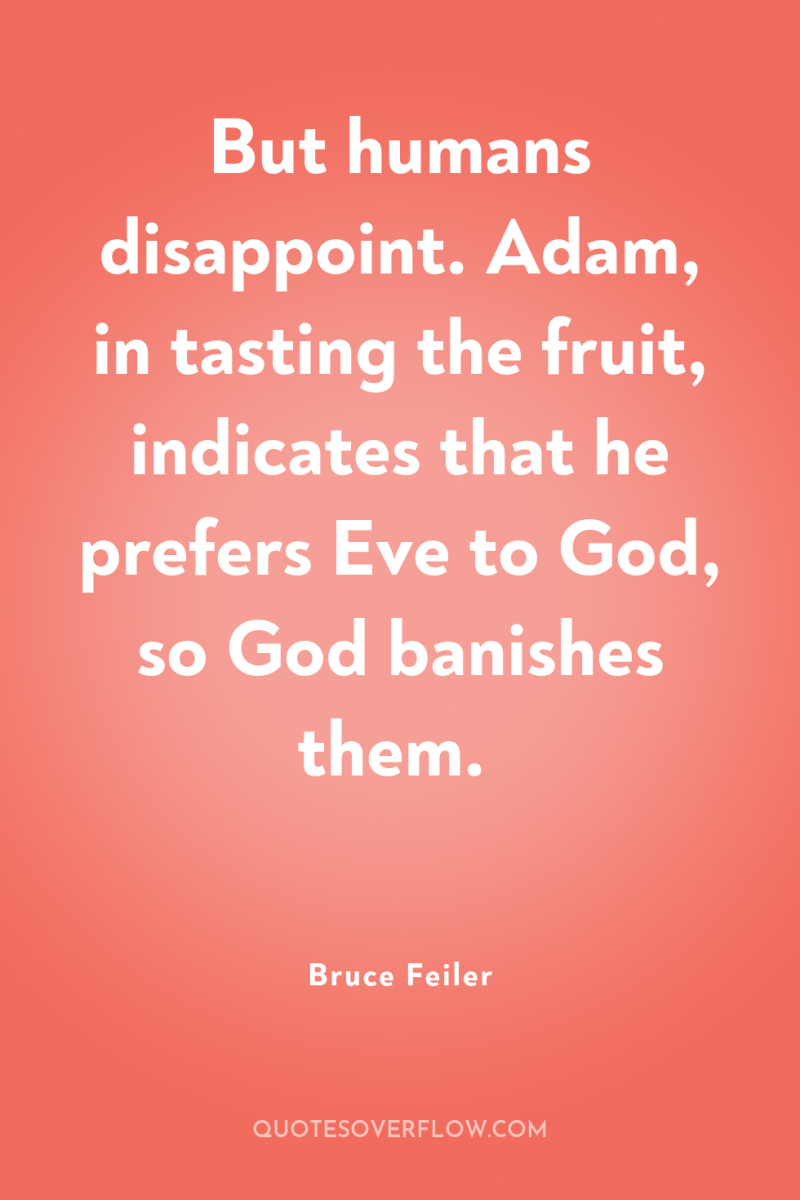1
Tko npr. formulira govor o Bogu Abrahamovu, Izakovu i Jakovljevu tako da se u njemu viÅ¡e ne Äuje Jobov uzdisaj i tužaljka 'Ta dokle joÅ¡?', taj se ne bavi teologijom nego mitologijom.Johann Baptist Metz

2
But humans disappoint. Adam, in tasting the fruit, indicates that he prefers Eve to God, so God banishes them.Bruce Feiler
3
For when God is said by these things to try men and prove them, to see what is in their hearts and whether they will keep His commandments or no, we are not to understand, that it is for His own information, or that He may obtain evidence Himself of their sincerity (for he needs no trials for His information); but chiefly for their conviction, and to exhibit evidence to their consciences.. So when God tempted or tried Abraham with that difficult command of offering up his son, it was not for His satisfaction, whether he feared God or no, but for Abraham's own greater satisfaction and comfort, and the more clear manifestation of the favour of God to him.Jonathan Edwards
4
Should one of them after having caught the greatness of Abraham's deed, but also the appallingness of it, venture out on the road, I would saddle my horse and ride along with him. At every stop before we came to the mountain in Moriah I would explain to him that he could still turn back, could rue the misunderstanding that he was called to be tried in a conflict of this nature, could confess that he lacked the courage, so that if God wanted Isaac God must take him himself.Johannes De Silentio
5
Abraham I cannot understand; in a way all I can learn from him is to be amazed. If one imagines one can be moved to faith by considering the outcome of this story, one deceives oneself, and is out to cheat God of faith's first movement, one is out to suck the life-wisdom out of the paradox. One or another may succeed, for our age does not stop with faith, with its miracle of turning water into wine; it goes further, it turns wine into water.Johannes De Silentio
6
I think I have a very good idea why it is that anti- Semitism is so tenacious and so protean and so enduring. Christianity and Islam, theistic though they may claim to be, are both based on the fetishizing of human primates: Jesus in one case and Mohammed in the other. Neither of these figures can be called exactly historical but both have one thing in common even in their quasi-mythical dimension. Both of them were first encountered by the Jews. And the Jews, ravenous as they were for any sign of the long-sought Messiah, were not taken in by either of these two pretenders, or not in large numbers or not for long.? I myself certainly hope that it will not. The Jews have seen through Jesus and Mohammed. In retrospect, many of them have also seen through the mythical, primitive, and cruel figures of Abraham and Moses. Nearer to our own time, in the bitter combats over the work of Marx and Freud and Einstein, Jewish participants and protagonists have not been the least noticeable. May this always be the case, whenever any human primate sets up, or is set up by others, as a Messiah.Christopher Hitchens

7
Did god make man too perfect, So that a piece has to be removedthrough circumcision?A.J. Beirens
8
I think I have a very good idea why it is that anti- Semitism is so tenacious and so protean and so enduring. Christianity and Islam, theistic though they may claim to be, are both based on the fetishizing of human primates: Jesus in one case and Mohammed in the other. Neither of these figures can be called exactly historical but both have one thing in common even in their quasi-mythical dimension. Both of them were first encountered by the Jews. And the Jews, ravenous as they were for any sign of the long-sought Messiah, were not taken in by either of these two pretenders, or not in large numbers or not for .Christopher Hitchens
9
For a brief moment the previous day, I’d felt a flicker of kinship with him because of my own barrenness, but he brandished his brokenness like a sword, ready to cut anyone who displeased him because someone in Pharaoh’s household had once cut him.Kristen Reed

10
I tried to close my ears to the strange worshipful chanting and fix my mind on God, but the Egyptians’ idolatry weighed down my weary shoulders and brought tears to my closed eyes.Kristen Reed
11
If you knew your potential to feel good, you would ask no one to be different so that you can feel good. You would free yourself of all of that cumbersome impossibility of needing to control the world, or control your mate, or control your child. You are the only one who creates your reality. For no one else can think for you, no one else can do it. It is only you, every bit of it you.Esther Hicks
12
If you find that you're going through hell, keep moving. You will get to the end eventually.Kimberly Brouillette
13
Change your mind and change your whole life experience.C.G. Rousing
14
Keep in mind too, our failures serve to teach us, and usually teach us more than our successes do. What we may perceive as a failure is also an opportunity for someone else to rise to the occasion and perform a mitzvah, or mitzvot. Do not begrudge someone their joyous performance of mitzvot. Sometimes, perhaps even more often then you may think, what we consider our failures were blessings in disguise for ourselves, or others, or everyone. Abraham did not change the world just because he himself changed, and followed his own destiny. He changed the world through his giving others opportunities to rise to their own greatness.Laura Weakley
15
Let the preacher tell the truth. Let him make audible the silence of the news of the world with the sound turned off so that in the silence we can hear the tragic truth of the Gospel, which is that the world where God is absent is a dark and echoing emptiness; and the comic truth of the Gospel, which is that it is into the depths of his absence that God makes himself present in such unlikely ways and to such unlikely people that old Sarah and Abraham and maybe when the time comes even Pilate and Job and Lear and Henry Ward Beecher and you and I laugh till the tears run down our cheeks. And finally let him preach this overwhelming of tragedy by comedy, of darkness by light, of the ordinary by the extraordinary, as the tale that is too good not to be true because to dismiss it as untrue is to dismiss along with it that catch of the breath, that beat and lifting of the heart near to or even accompanied by tears, which I believe is the deepest intuition of truth that we have.Frederick Buechner
16
Abraham had eight sons--not one. All eight sons bring something to the table. Abraham loved all of his sons. He was a good father who made sure all his sons were literate, of good character and shared a common ideology with their father, Abraham. Abraham did good. Where did we go wrong?pg 54Michael Ben Zehabe
17
And one day, God would send another baby, a baby promised to a girl who didn't even have a husband. But this baby would bring laughter to the whole world. This baby would be everyone's dream come true.Sally LloydJones
18
Your frequency is what you frequently see. Pay attention to synchronicity as there are valuable lessons to be learned in the repetition of your reality.Jennifer Sodini
19
All Abraham's sons were taught that God would progressively reveal Himself. God's wholeness has yet to be realized. There will always be gaps in our understanding. Why should we fill those gaps with suspicion, bigotry and accusations? Men do it to women; Jews do it to Christians; Christians do it to Muslims. Yet, all these have an implied duty to Abraham.pg 54Michael Ben Zehabe
20
The central fact of biblical history, the birth of the Messiah, more than any other, presupposes the design of Providence in the selecting and uniting of successive producers, and the real, paramount interest of the biblical narratives is concentrated on the various and wondrous fates, by which are arranged the births and combinations of the 'fathers of God.' But in all this complicated system of means, having determined in the order of historical phenomena the birth of the Messiah, there was no room for love in the proper meaning of the word. Love is, of course, encountered in the Bible, but only as an independent fact and not as an instrument in the process of the genealogy of Christ. The sacred book does not say that Abram took Sarai to wife by force of an ardent love, and in any case Providence must have waited until this love had grown completely cool for the centenarian progenitors to produce a child of faith, not of love. Isaac married Rebekah not for love but in accordance with an earlier formed resolution and the design of his father. Jacob loved Rachel, but this love turned out to be unnecessary for the origin of the Messiah. He was indeed to be born of a son of Jacob - Judah - but the latter was the offspring, not of Rachel but of the unloved wife, Leah. For the production in the given generation of the ancestor of the Messiah, what was necessary was the union of Jacob precisely with Leah; but to attain this union Providence did not awaken in Jacob any powerful passion of love for the future mother of the 'father of God' - Judah. Not infringing the liberty of Jacob's heartfelt feeling, the higher power permitted him to love Rachel, but for his necessary union with Leah it made use of means of quite a different kind: the mercenary cunning of a third person - devoted to his own domestic and economic interests - Laban. Judah himself, for the production of the remote ancestors of the Messiah, besides his legitimate posterity, had in his old age to marry his daughter-in-law Tamar. Seeing that such a union was not at all in the natural order of things, and indeed could not take place under ordinary conditions, that end was attained by means of an extremely strange occurrence very seductive to superficial readers of the Bible. Nor in such an occurrence could there be any talk of love. It was not love which combined the priestly harlot Rahab with the Hebrew stranger; she yielded herself to him at first in the course of her profession, and afterwards the casual bond was strengthened by her faith in the power of the new God and in the desire for his patronage for herself and her family. It was not love which united David's great-grandfather, the aged Boaz, with the youthful Moabitess Ruth, and Solomon was begotten not from genuine, profound love, but only from the casual, sinful caprice of a sovereign who was growing old. .Vladimir Sergeyevich Solovyov
21
It was a black and hooded head; and hanging there in the midst of so intense a calm, it seemed the Sphynx’s in the desert. “Speak, thou vast and venerable head, ” muttered Ahab, “which, though ungarnished with a beard, yet here and there lookest hoary with mosses; speak, mighty head, and tell us the secret thing that is in thee. Of all divers, thou hast dived the deepest. That head upon which the upper sun now gleams, has moved amid this world’s foundations. Where unrecorded names and navies rust, and untold hopes and anchors rot; where in her murderous hold this frigate earth is ballasted with bones of millions of the drowned; there, in that awful water-land, there was thy most familiar home. Thou hast been where bell or diver never went; hast slept by many a sailor’s side, where sleepless mothers would give their lives to lay them down. Thou saw’st the locked lovers when leaping from their flaming ship; heart to heart they sank beneath the exulting wave; true to each other, when heaven seemed false to them. Thou saw’st the murdered mate when tossed by pirates from the midnight deck; for hours he fell into the deeper midnight of the insatiate maw; and his murderers still sailed on unharmed–while swift lightnings shivered the neighboring ship that would have borne a righteous husband to outstretched, longing arms. O head! thou hast seen enough to split the planets and make an infidel of Abraham, and not one syllable is thine! .Herman Melville
22
Take the first A out of Abraham and put it at the end. You get Brahama. There’s the ancient connection right there.Ashwin Sanghi
23
Sol wanted to know how any ethical system — much less a religion so indomitable that it had survived every evil mankind could throw at it — could flow from a command from God for a man to slaughter his son. It did not matter to Sol that the command had been rescinded at the last moment. It did not matter that the command was a test of obedience. In fact, the idea that it was the obedience of Abraham which allowed him to become the father of all the tribes of Israel was precisely what drove Sol into fits of fury. .Dan Simmons
24
We encounter God in the face of a stranger. That, I believe, is the Hebrew Bible’s single greatest and most counterintuitive contribution to ethics. God creates difference; therefore it is in one-who-is-different that we meet god. Abraham encounters God when he invites three strangers into his tent.Jonathan Sacks
25
- But Abraham, you mean I'm supposed to make stuff up ! ?! ?- You are creators, you make stuff up all the time!Esther Hicks